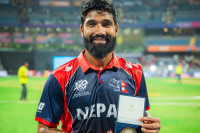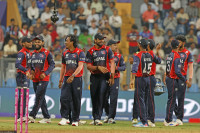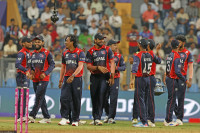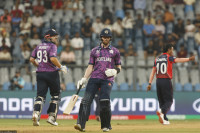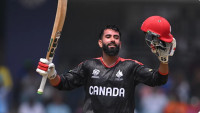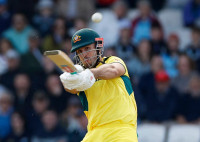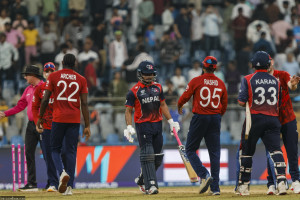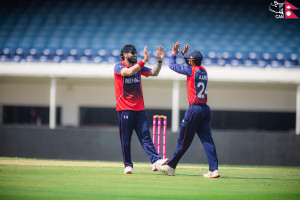Sports
With growing fan base and a regular league, Nepali basketball is finally coming into its own
Teams in the Nepal Basketball League are seeing more fans egging on players, including foreign recruits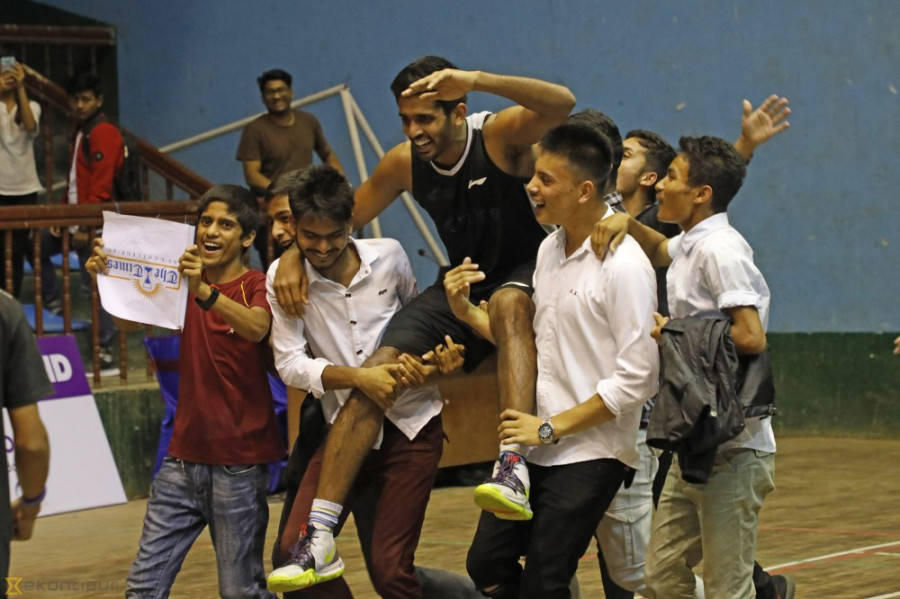
Adarsha Dhakal
National basketball team captain Sadish Pradhan was lost for words as he signed autographs for fans on Saturday. He, along with Sri Lankan recruit Praneeth Udumalagala, had just led their team, Times International Club, to a comfortable victory over archrivals Tribhuvan Army Club in the Nepal Basketball League. But this was the first time that Pradhan had met with such adulation from the crowd.
"I have been playing basketball for over a decade but this is the first time that I’ve seen fans seeking autographs from players,” said Pradhan. “We are glad that basketball players are being recognised. This is a good start for us."
Pradhan and Udumalagala had a whopping 60 points combined, defeating Tribhuvan Army Club 88-71 on their way to the title in the second edition of the Nepal Basketball League.
With regular competitions like the Nepal Basketball League, the sport seems to be finally coming into its own in Nepal. This year even saw the inclusion of players from across South Asia drafted into Nepali teams, raising the level of competition. And with more fans turning out for the games and showing support, players hope that a new era for Nepali basketball is dawning.
In this year’s league, Udumalagala was the clear fan favourite, with audience cheering the Sri Lankan on with shouts of “MVP! MVP!” whenever he stood for a free throw. In the final, Udumalagala was the first to reach out to jubilant Times supporters, who celebrated by lifting the forward on their shoulders. This kind of support was something he’d never expected when coming to Nepal, said Udumalagala.
"It’s a feeling that I cannot describe in words. The fans here were awesome,” he said. “We were on a mission that was ultimately accomplished. Getting support from the fans was really a wonderful feeling because that’s what we as players look for."
While Sri Lanka does have club games, it lacks a lengthy league, which is what Nepal offered Udumalagala. A long league provides opportunities to better your game and play competitively alongside decent players, according to players.
The Nepal Basketball League, currently in its second year, is organised by a private entity—Play for Deprived Children Nepal. Although the game’s governing body in the country, Nepal Basketball Association, is expected to hold such leagues, players don’t really mind who runs the show, as long as they get to play consistently.
"A double round-robin home-and-away league will always provide a great amount of exposure to players,” said Pradhan. “Young people have benefitted the most. For the first time, we have seen a fan following of players and the inclusion of foreign players, which has helped us learn their culture and establish ours as well."
While Nepal does have a national-level basketball tournament in the National Games, the eighth iteration of which was recently held in Dang, the tournament is often hastily organised and lacks the intensity required to test their mettle, say players. However, it is the only national-level tournament that Nepali hoopsters, both male and female, have gotten to play in the last year.
Nepal is scheduled to host the 13th South Asian Games in December this year, which will at least provides players with an opportunity to measure how the league has shaped them. But since Nepal has yet to complete constructing the infrastructure required for the successful hosting of the regional meet, uncertainty looms over the country’s ability to host the games.
Despite their uncertainties, with the Nepal Basketball Association consistently failing to plan a progressive calendar for the development of the game, the league has served as a godsend for hoopsters, and not just male players. Play for Deprived Children Nepal also organises a women's league, which this year saw the inclusion of two Filipino nationals and a Bhutanese in one of the four teams that competed in a double round-robin league.
"We got to play a large number of games and that was what we were looking for,” said Alisha Malla, whose Nepal Police Club team toppled the Samriddhi Gorillas after losing against the same side twice in the league stage. “We often get to play very few matches in knock-out tournaments, but playing in a league has definitely tested us."
These are welcome developments for Nepal’s basketball scene but the sport is still a long way behind other sports. The Nepal Basketball League is still not as lucrative as football leagues or the country's franchise Twenty20 cricket competitions. The basketball league offers just Rs200,000 as prize money to the men's champions—less than what the best players in football leagues are getting. The women's league winners, meanwhile, receive a mere Rs50,000.
According to Arun Karki, president of Play for Deprived Children Nepal, corporate sponsors aren’t really interested in basketball; football and cricket remain way above basketball in their pecking order.
"Basketball can now attract viewers both in and out of the country, as we have a quality competition where foreigners participate,” said Karki. “Better competition should lure corporate sponsors to the game, but we’ve got to work on that front."
Basketball, despite its shortcomings, is still the only sport that sees a lengthy double league that lasts for almost two months and keeps the game alive. Karki wants to transform the league into the best possible shape professionally, but knows there are a lot of challenges.
"Our plan is to get into a franchise model so that money can be rolled out for everyone. We want to take six teams each in both the men's and women's events and hand it over to franchises,” said Karki. “And since foreigners are also interested in participating in the league, we don't think roping in quality players will be a problem.”




 22.12°C Kathmandu
22.12°C Kathmandu
